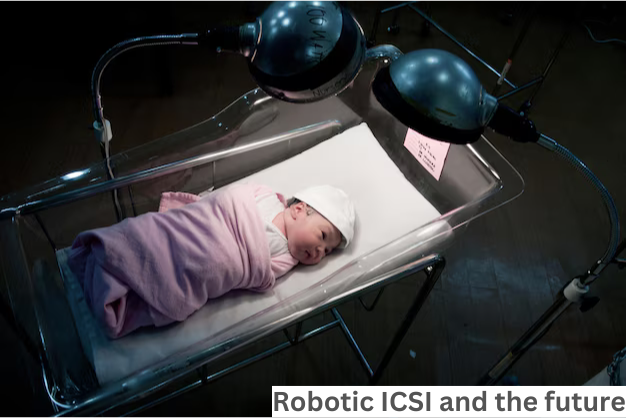Robotic ICSI and the future
The field of reproductive medicine is constantly evolving, and with each advancement, the dream of parenthood comes closer to reality for many couples. One such groundbreaking technology is Robotic ICSI. This innovative approach to assisted reproductive technology (ART) offers several advantages over traditional ICSI, making it a promising avenue for couples struggling with infertility.
What is Robotic ICSI?
Robotic ICSI is a minimally invasive procedure that uses a robotic arm to perform intracytoplasmic sperm injection (ICSI). In traditional ICSI, a skilled embryologist manually injects a single sperm into an egg. Robotic ICSI, on the other hand, utilizes a robotic arm with high-precision instruments to perform this delicate procedure.
Advantages of Robotic ICSI
Enhanced Precision: Robotic arms offer unparalleled precision and accuracy, allowing for more precise injection of sperm into the egg. This can lead to higher fertilization rates and improved embryo quality.
Reduced Human Error: By minimizing human intervention, robotic ICSI reduces the risk of human error, which can be a significant factor in IVF outcomes.
Consistent Results: Robotic systems provide consistent results, as they are not affected by factors like fatigue or hand tremors that can impact human performance.
Minimally Invasive: The minimally invasive nature of robotic ICSI reduces the risk of damage to the egg and sperm.
Improved Success Rates: Studies have shown that robotic ICSI may lead to higher success rates compared to traditional ICSI, especially in cases of severe male factor infertility.
How Robotic ICSI Works
The process of robotic ICSI is similar to traditional ICSI, but with a robotic arm taking over the role of the embryologist. Here's a brief overview:
1. Egg Retrieval: Eggs are retrieved from the ovaries using a minimally invasive procedure.
2. Sperm Preparation: Sperm are prepared for injection.
3. Robotic Injection: The robotic arm, guided by the embryologist, injects a single sperm into each mature egg.
4. Embryo Culture: Fertilized eggs are cultured in a laboratory setting.
5. Embryo Transfer: The best-quality embryos are transferred to the uterus.
The Future of Fertility Treatment
Robotic ICSI is a significant step forward in the field of reproductive medicine. As technology continues to advance, we can expect even more innovative techniques to emerge. Some potential future developments in fertility treatment include:
Artificial Intelligence: AI-powered systems can analyze vast amounts of data to optimize treatment protocols.
Gene Editing: Techniques like CRISPR-Cas9 could be used to correct genetic defects in embryos.
3D Bioprinting: 3D bioprinting technology may enable the creation of artificial reproductive organs.
New World Fertility Centre: Your Partner in Fertility
At New World Fertility Centre, Delhi, we are committed to providing cutting-edge fertility treatments. We are constantly exploring new technologies and techniques to help our patients achieve their dream of parenthood. Our experienced team of fertility specialists is dedicated to providing personalized care and support throughout your journey.
Frequently Asked Questions (FAQs)
1. What is Robotic ICSI?
Robotic ICSI (Intracytoplasmic Sperm Injection) is an advanced fertility procedure that uses robotic technology and artificial intelligence (AI) to inject a single sperm into an egg with unmatched precision, improving fertilization outcomes.
2. How is Robotic ICSI different from traditional ICSI?
While traditional ICSI relies on manual sperm injection by embryologists, Robotic ICSI uses robotic arms and AI to perform the injection with greater accuracy, minimizing the risk of human error and egg damage.
3. Who can benefit from Robotic ICSI?
Robotic ICSI is ideal for:
- Couples facing severe male infertility (low sperm count, poor motility, or abnormal morphology).
- Patients with repeated IVF failures.
- Cases involving poor-quality eggs or complex fertility challenges.
4. What are the advantages of Robotic ICSI?
The key benefits include:
- Higher fertilization rates due to precise sperm injection.
- Reduced chances of egg damage.
- AI-driven selection of the healthiest sperm.
- Faster and more efficient procedures.
5. Is Robotic ICSI safe?
Yes, Robotic ICSI is considered safe. Its automated precision and real-time monitoring reduce risks associated with manual intervention, such as egg damage or procedural inconsistencies.

 Nov-20-2024
Nov-20-2024